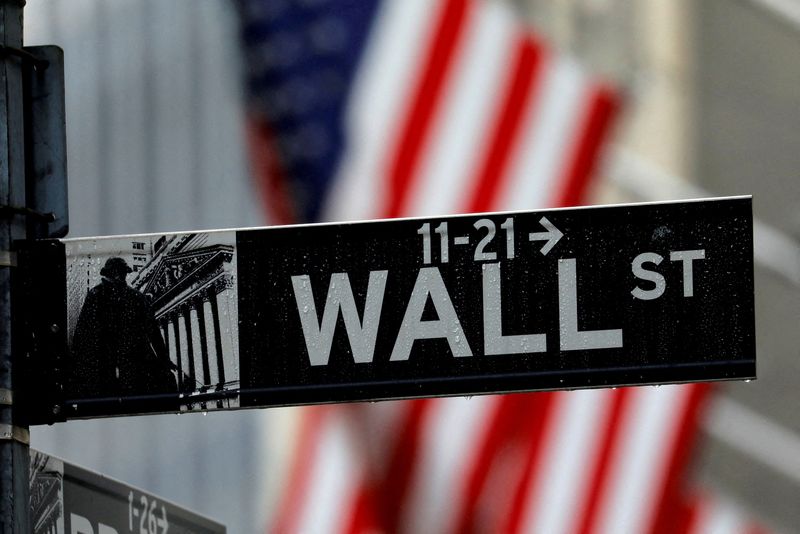Investing.com -- The Dow closed at record high Wednesday after the Federal Reserve's decision to keep rates unchanged, but forecast deeper rate cuts for next year, pushed growth stocks including tech sharply as Treasury yields slumped.
By 16:00 ET (21:00 GMT), the Dow Jones Industrial Average was up 506 points to close at record high of 37,084.78. The S&P 500 was up 1.4%, and NASDAQ Composite jumped 1.4% to an all time high.
Fed's dovish tilt brings joy to stocks as March cut within sight
The Federal Reserve kept interest rates steady on Wednesday for the third straight meeting, and signaled that inflation is expected to cool faster than initially anticipated, setting up potential cuts next year.
Fed members estimated that the benchmark rate will fall to 4.6% next year, suggesting three rate cuts in 2024, from a prior projection of 5.1%, or two rate cuts.
"The dot plot chart indicates three rate cuts in 2024, with the futures curve pricing in four rate cuts next year," Steve Miley, COO and Chief Analyst at TradeDay told Investing.com in an email.
About 60% of traders expect the Fed to cut as soon as March, compared with about 40% a day earlier, according Investing.com's Fed Rate Monitor Tool.
Treasury yields fall sharply to boost stocks
Treasury yields fell sharply following the Fed decision, with the yield on the two-year Treasury falling 28 basis points to 4.447% and 19 basis points on the 10-year Treasury to 4.024%
The move lower in Treasury yields, which trade inversely to price, is expected to continue into the holiday through year end into early 2024, Miley said, paving the way for further gains in stocks.
"We expect the positive correlation between stocks and US bonds seen through November to encourage significant gains for equities, for a Santa rally in stocks to extend through into January, as the major US stock averages hit new multi-month highs, maybe even challenging all time peaks into Q1 2024," Miley added.
Inflation continues to slow
The November producer prices were unexpectedly unchanged in November as a decline in the cost of energy products more than offset higher food prices, confirming that the country remained on a disinflationary path.
Signs of ongoing disinflation come just a day after the November consumer prices continued to show slowing price pressures.
Pfizer slumps after sales forecast disappointment
In corporate news, Pfizer (NYSE:PFE) stock slumped over 6% after the drugmaker forecast 2024 sales substantially below previous expectations due mostly to declining demand for COVID vaccines and treatment.
Southwest Airlines (NYSE:LUV) stock fell 4% after the low cost carrier raised its forecast for fourth-quarter fuel costs, while Tesla (NASDAQ:TSLA) cut losses to close 1% despite announcing a decision to recal just over two million vehicles in the United States fitted with its Autopilot advanced driver-assistance system to install new safeguards.
Official U.S. inventories fall more than expected
Oil prices settled higher Wednesday, after data showed U.S crude inventories fell by much more than expected last week.
The Energy Information Administration reported Wednesday that U.S. oil inventories fell by 4.3M (NYSE:MMM) barrels in the week ended Dec. 8, compared with expectations for a decline of 650,000 barrels.
But the potential draw arrived on the heels of several consecutive weeks of strong builds, keeping upside momentum in check.
Upgrade your decision-making with InvestingPro+! Using discount code “INVESTPRO” receive an additional 10% off the InvestingPro+ yearly subscription. Click here and don't forget the discount code.
(Peter Nurse contributed to this report.)
